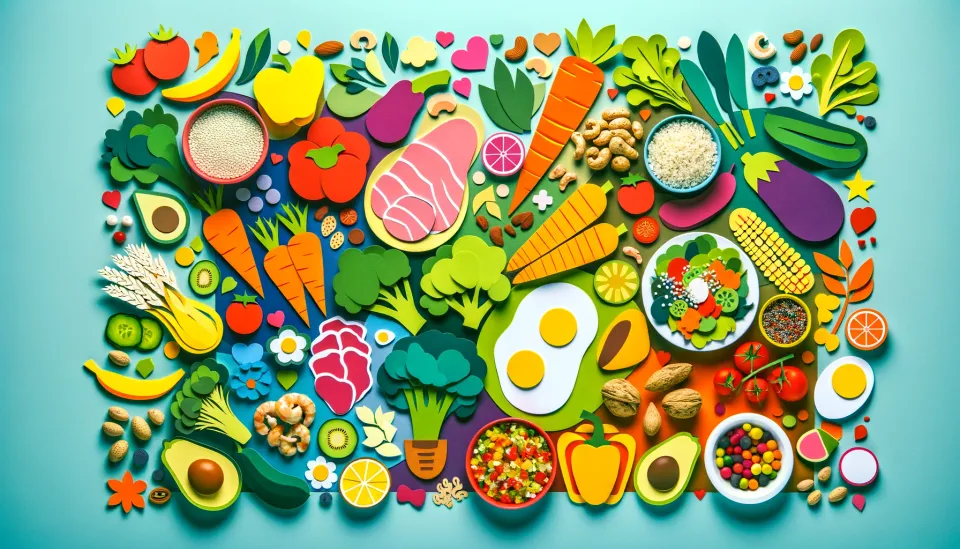The Simple Path to a Healthy Diet

In our quest for greatness, being productive and courageous members of society, it's crucial to remember that our bodies are the vehicles that drive our ambitions.
Think of yourself as a high-end race car; you wouldn't fill a Ferrari with low-grade fuel, would you?
The same principle applies to our bodies. It's not just about hitting the gym; it's equally important to focus on what we put on our plates.
A healthy diet, coupled with avoiding the abuse of drugs and alcohol, does a significant portion of this 'heavy lifting' in our wellness journey.
The Basics of a No-Nonsense Diet
Dieting doesn't have to be complicated.
In fact, the more complex you make it, the more likely you are to veer off track.
Here's a simple formula:
lean protein + whole carbs + loads of vegetables, and a dose of healthy fats.
Structuring two to three meals a day around these components puts you well ahead in the nutrition game.
Lean Protein
Lean proteins are vital for muscle repair, growth, and overall body function, particularly for those who are physically active.
Top 7 Sources:
- Chicken Breast: High in protein and low in fat, especially when the skin is removed.
- Pork Tenderloin: Similar to chicken, it's a great source of lean protein.
- Fish: Salmon, cod, and tilapia offer lean protein along with healthy omega-3 fatty acids.
- Eggs: A versatile and affordable source of high-quality protein.
- Lean Beef: Look for cuts like sirloin or tenderloin, which are lower in fat.
- Tofu: A great plant-based protein source, rich in protein and low in fat.
- Lentils and Beans: Excellent for those preferring plant-based proteins, offering fiber as well.
Carbs are Not the Enemy
Carbohydrates are essential for energy and should not be feared. Opt for complex carbs that provide sustained energy and are packed with nutrients.
Top 7 Sources:
- Quinoa: A complete protein and a great source of complex carbs.
- Brown Rice: Less processed than white rice, retaining more nutrients.
- Oats: Ideal for breakfast, rich in fiber and can help in controlling blood sugar levels.
- Sweet Potatoes: High in vitamins, fiber, and are a healthier alternative to regular potatoes.
- Whole Grain Bread: Look for true whole grain options for maximum benefits.
- Legumes: Beans, lentils, and chickpeas are great sources of carbs and protein.
- Barley: A nutritious grain that's often overlooked, great in soups and stews.
Veggies Galore
Vegetables are essential for their vitamins, minerals, and fiber. They should be a large part of your diet.
Top 7 Sources:
- Broccoli: High in vitamins C, K, and fiber.
- Spinach: Loaded with iron, calcium, and antioxidants.
- Kale: A nutrient powerhouse, high in vitamins A, C, and K.
- Bell Peppers: High in vitamins and antioxidants, and available in various colors.
- Carrots: A great source of beta carotene, fiber, and vitamin K1.
- Tomatoes: Rich in vitamin C and lycopene, an antioxidant.
- Cauliflower: Versatile and high in fiber and B-vitamins.
Healthy Fats
Fats are necessary for nutrient absorption and overall health, but it's important to choose healthy sources.
Top 7 Sources:
- Avocados: Loaded with heart-healthy monounsaturated fats.
- Nuts: Almonds, walnuts, and pistachios are great choices.
- Seeds: Chia seeds, flaxseeds, and hemp seeds are nutrient-dense.
- Olive Oil: Great for cooking or dressings, high in monounsaturated fats.
- Fatty Fish: Salmon and trout offer omega-3 fatty acids.
- Greek Yogurt: Full-fat versions offer good fats and are high in protein.
- Dark Chocolate: Choose high-cocoa content for a healthy treat.
By focusing on these foods, you can ensure a balanced diet that provides all the nutrients your body needs without overcomplication. Remember, variety is key to a healthy diet, so try to include as many of these options as possible in your meals!
The 80/20 Rule
Life is about balance. If you stick to the formula above 80% of the time, it allows for flexibility in the remaining 20%. Craving chocolate, pizza, or apple crumble with cream? Indulge occasionally. It's not about restriction; it's about moderation.
The Danger of Overcomplication
We often fall into the trap of making dieting a complex affair with rigid rules, leading to unnecessary stress and eventual failure. Stop the fear-mongering about foods and focus on the basics. A balanced diet isn't about strict limitations; it's about nurturing your body with what it needs while allowing room for the foods you love.
Actionable Advice
- Start Simple: Focus on incorporating the basic components of a balanced diet into your daily meals.
- Listen to Your Body: Pay attention to how different foods make you feel. Your body often tells you what it needs.
- Moderation, Not Restriction: Allow yourself occasional indulgences. It's about balance, not deprivation.
- Ditch the Diet Mindset: Instead of thinking 'diet', think 'lifestyle change'. It's a long-term commitment to your health.
Reflection
Consider your current eating habits.
- Are they overly complicated?
- How can you simplify your approach to nutrition while still enjoying the foods you love?
Remember, your body is your vehicle to greatness – fuel it wisely!
Embracing a simple, balanced approach to nutrition can profoundly impact your physical and mental health. It's not about being perfect; it's about making better choices most of the time. So, fuel your body like the high-end race car it is, and watch how it propels you towards your goals.